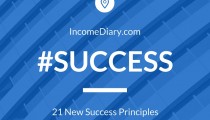Top 10 Business Lessons from Bill Gates
Bill Gates dropped out of Harvard in 1974.
In I975, he co-founded Microsoft – a computer software company that would eventually make Gates the world’s wealthiest man. He earned the money by masterfully guiding the world into the era of networked personal computers.
Today, Gates is no longer the world’s wealthiest, but he’s still worth a healthy US$ 59 billion.
He’s retired from his role as Microsoft’s CEO and instead devotes himself full-time to philanthropy through the Bill & Melinda Gates Foundation. Below, you’ll find 10 business lessons from the life of Bill Gates.
#1 Get Lucky

Gates is a very smart man, but he’s benefitted from more than his fair share of dumb luck.
In 1968, Gates was an eighth grader, attending a private middle school in Seattle called Lakeside. That year, the school invested $3,000 in a state-of-the-art computer.
13-year-old Bill joined computer club and was instantly hooked. He and a handful of other enthusiastic students racked up hours and hours on the machine, learning how to program through trial and error. It was the beginning of a journey that would propel Gates to astronomical success.
Here’s where the dumb luck comes in: in the 1960s, very few colleges had computer labs and a middle school with a computer was unheard of. The chances of a 13-year-old having access to a computer were pretty much one-in-a-million.
If Lakeside hadn’t purchased a computer, then young Bill might never have discovered his love for computer programming and he never would have started Microsoft.
#2 Make the Most of the Luck You’re Given
Bill may have been ridiculously lucky, but all the computer time in the world wouldn’t have meant anything if he hadn’t dedicated himself so fully to master it.
Ultimately, it was the thousands of hours of focused labor that made Gates into the type of computer genius who could start a successful software company.
We don’t always recognize it, but each of us is uniquely lucky. Whether through our natural talents, our circumstances, or our relationships with others, we’re all fortunate to have many paths to success in front of us.
Take in your luck for a moment – and then capitalize on it.
#3 Bite Off More than You Can Chew

Microsoft’s big break came from Bill Gates telling a fib.
Gates called up a computer company called MITS and told them that they had developed a BASIC interpreter for their microcomputer, the Altair 8800.In 1975, Gates and his childhood programming buddy, Paul Allen, were looking for a way to turn their shared computer hobby into a career.
MITS was interested in seeing a demonstration of the software. This presented a problem, since the software Bill had promised didn’t actually exist.
Gates and Allen developed it in a hurry, presented it to MITS, and made the sale. They officially founded Microsoft one month later, in April 1975.
“An entrepreneur tends to bite off a little more than he can chew hoping he’ll quickly learn how to chew it.”
– Roy Ash, co-founder of Litton Industries
By always pushing yourself to deliver a little bit more than you’ve proven yourself capable of, you’ll go further, faster in your business ventures.
That said, I don’t recommend that you follow Bill’s lead and actually lie to your potential clients.
#4 Quality Control is Crucial

As Microsoft grew, it began hiring more and more programmers.
Gates had taken on the role of CEO and his job didn’t call for any programming. But that didn’t stop him from reviewing – and often rewriting – every single line of code that the company released.
Bill’s keen eye for detail ensured that Microsoft always shipped quality software. It also made sure that he never lost track of his team and that he was always intimately familiar with Microsoft’s products.
As your business grows, you’ll likely have to hire a team of employees. It may be tempting to just let them work and trust that they’re doing a good job. But your company has a reputation to protect, so take a page from Gates’ book and keep a close watch on your team’s output.
#5 Revolutionary Ideas are Shown, Not Told
Computer screens once displayed just text.
In the early 80’s, Bill Gates and Steve Ballmer would travel around the country delivering seminars about how graphic interfaces were the operating systems of the future – but nobody believed them.
Computer companies told the Microsoft boys that graphic interfaces would be too slow and that it would be difficult to write the software for them. They were less than enthusiastic when Microsoft announced in 1983 that it was developing Windows.

Attitudes changed quickly in 1984, when Apple launched the Macintosh. It became the first commercially successful computer with a graphical user interface (GUI).
All of a sudden, it was obvious to everyone that the wave of the future involved windows, icons, menus, and a pointing device. Within a few years, the market was flooded with graphical OS software. Notable examples include Deskmate, Workbench, and – of course – Microsoft Windows.
Microsoft was able to release Windows 1.0 in 1985, just a year after the Mac’s success, because they had actually started developing the software two years earlier.
If you’ve got a revolutionary idea, don’t worry if other people don’t get it. Start developing it now so that you’ll be prepared when the time is right.
#6 Persevere
There is nothing that was overnight.
– Bill Gates
![]()
 Windows 1.0 actually wasn’t much of a success.
Windows 1.0 actually wasn’t much of a success.![]()
Microsoft released Windows 2.0 two years later, in 1987, but it didn’t fare much better. It found moderate success thanks to software – in particular, Excel, Word, and Aldus Pagemaker.
It wasn’t until 1990, when Microsoft launched Windows 3.0, that they found significant success with a graphical operating system. It was a big moneymaker for the company and it sold over 10 million units in just two years.
Microsoft had found the model that would transform them into a computer software giant.![]()
#7 Share Your Vision with Your Team
Just as Gates has seen the advent of the graphical interface years in advance, he predicted the preeminence of the Internet long before the average Joe had a dial-up connection.
By May 1995, Gates was so convinced that the Internet was Microsoft’s future, that he felt compelled to write a very, very long memo to his company. It concluded:
“The Internet is a tidal wave. It changes the rules. It is an incredible opportunity as well as incredible challenge. I am looking forward to your input on how we can improve our strategy to continue our track record of incredible success.”
Gates took the time to write this memo because he recognized how important it was for his whole team to be on board with Microsoft’s mission. The result: Windows 95 came bundled with Internet Explorer.
#8 Marketing is Simple
People don’t buy a product because it’s got a great logo or a low price. They buy because they’ve got a problem and they’re convinced that the product will solve it.
The most difficult part about marketing, then, isn’t coming up with the right tagline. It’s providing a great solution to an actual problem. If you can do that and then demonstrate it, then marketing your solution is simple.
If you show people the problems and you show people the solutions, they will be moved to act.
– Bill Gates
#9 Don’t Learn From Success
It seems obvious that we should reflect on our successes and learn from them. If we can recognize the factors that contributed to that initial success, we should be able to repeat them and repeat our success.
But Gates has argued that success can actually cloud our vision, causing us to become over-confident and unprepared for the new challenges that the future holds.
Success is a lousy teacher. It seduces smart people into thinking they can’t lose.
– Bill Gates
We shouldn’t ignore the patterns of our initial success. But neither should we cling blindly to particular actions or strategies simply because they’ve worked in the past.
#10 Learn from Unhappy Customers
Over the years, Bill Gates has made a ton of his customers unhappy.
Anyone who has stared at the “blue screen of death” understands why.
But as much as people love to complain about Windows, they continue to use it. Windows has been the world’s primary operating system since 1990 and it boasts a stout 82.5% market share as of August 2011.
The reason is simple: Microsoft continues to respond to customer feedback and improve their products. The attitude starts with Bill Gates, himself:
Your most unhappy customers are your greatest source of learning.
– Bill Gates
Looking Forward
Bill Gates career has been marked by his incredible vision. Microsoft beat out the competition largely because they were always looking one step ahead, to the next revolutionary idea.
The lesson here: if you want to get ahead in business, think ahead.
Gates was still thinking ahead when he retired from Microsoft in 2008. He told PC Mag that he thought the Tablet PCs, Internet TV, and natural user interface would be thriving in the near future. History is proving him right.
So, if Gates knew what was coming next, why didn’t he stick around to make it happen? Surely, he could have added a few billion more to his bank accounts.
The answer is that, at some point while thinking about the future, Gates started giving more importance to health care, poverty, and education than he did to the next hi-tech gizmo. He’s making a bigger impact on the future through The Bill & Melinda Gates Foundation than he would have made by continuing to run Microsoft.
Images Courtesy of
"Do Not Write Another Blog Post Until You Watch This Free Video..."

Watch this free video to learn...
- How I got over 10,000,000 people to visit my websites.
- The types of blog post that got me all that traffic.
- How to get someone else to do it for you!













i particularly like number 5. Anything is more convincing shown not told. if we want to succeed, this must be applied. Awesome post as usual, Thanks Nick
Thanks. That one’s my favorite too. I believe I wrote it first.
What a great man this guy is. I like the idea of biting a little more than we can chew. I think it’s the only way to pushing ourselves over old limits. very inspiring and informative as usual Nick, thanks.
H David
Thanks, David. Yeah, it’s a great way to accelerate growth.
One more good article Nick!!
Thank you..
Would it not be a good Idea to have a comparative table of Business lessons by Mr. Jobs, Mr. Gates, Mr. Buffett and many other and put them all to-gather on one page and publish it as a wallpaper?? Just a thought!!
Cheers!!
Hmmm… I was actually thinking about collecting some stories and lessons from the life of Warren Buffett for an upcoming post. But I’m not totally sure how the comparative table would work…
awesome posting
Thanks!
I wish Gates would have stuck with computer software for what he is doing now is criminal but he probably has just been given the mainstream medical hype on vaccinations. It is a means of population control. Look at the real facts.
Maybe he had his arms twisted since is anti-trust lawsuit by the government disappeared and then he was supporting the vaccinations of massive children and helping out big pharma with his money.
Something to look into and think about.
I looked into it a little bit and you can call me a skeptic. Gates has expressed interest in slowing the growth of the world’s population (7 billion and growing) and it is possible for a vaccine to be created that would cause infertility… but none of the vaccines Gates is helping promote actually do that, as far as I can tell. My guess is that he’s genuinely trying to make the world a better place. Thanks for adding your perspective.
Awesome article Nick – 1 through 10, all of it. I think 7-10 were my favorite. In any case very inspiring, you just have to do do do and keep grinding.
Keep grinding — definitely good advice.
I liked the article but I prefer not to follow, copy or get influenced from others whether they are top icons, they are in this place becoz they had never taken part in the race but have started their own race. If Gates had followed the trends then he would have never been in this stage. If you should have passion & dedication on what you are doing. So, we have to do something that stands out from the traditional trends no matter, what other do!!
Very interesting response. I think it’s a great idea to start your own race by your own rules. But that’s also what this post is about (#5 is about believing in your vision even when others don’t and #9 is about not paying too much attention to the lessons of past successes). Thanks for reading!
Your conclusion reminds me of the Wayne Gretzky quote, “I skate to where the puck is going to be, not to where it’s been.”
Yeah, it’s a lot easier to find long-term success if you’re actually thinking long-term. Spending even just a half-hour considering what’s likely to happen in your industry in the next five years can go a long way.
I enjoy writing/working outside in the summertime–it’s something about the sunshine and fresh air. Today though the mosquitoes are being particularly pesky and it got me to thinking about why people generally don’t like mosquitoes and the business lessons we can learn from them.
i think the most important is to believe in your self ….
how many of us stick to only one carrier path even in negative circumstances..
@1970’s no hardly any one wish opt computer as life time carrier..
No doubt luck does matter, but its up to the person how much he/she can take advantage of that luck.
BTW, excellent piece of work
Nice blog, very interesting. What i’ve learnt from it is, that you should go for your goals. Whatever interests you in life you should just go for it. It worked for Bill !
Anticipating future trends and preparing to cater it, is the power of Gates. Confidence, hard work and dedication decided his life. He is a living role model for every entrepreneur.
– Mahesh
One of the most important things in business is learning from unhappy customers, your business won’t succeed or won’t make a single sales without customers so, it is very important to gain their trust and make them happy.